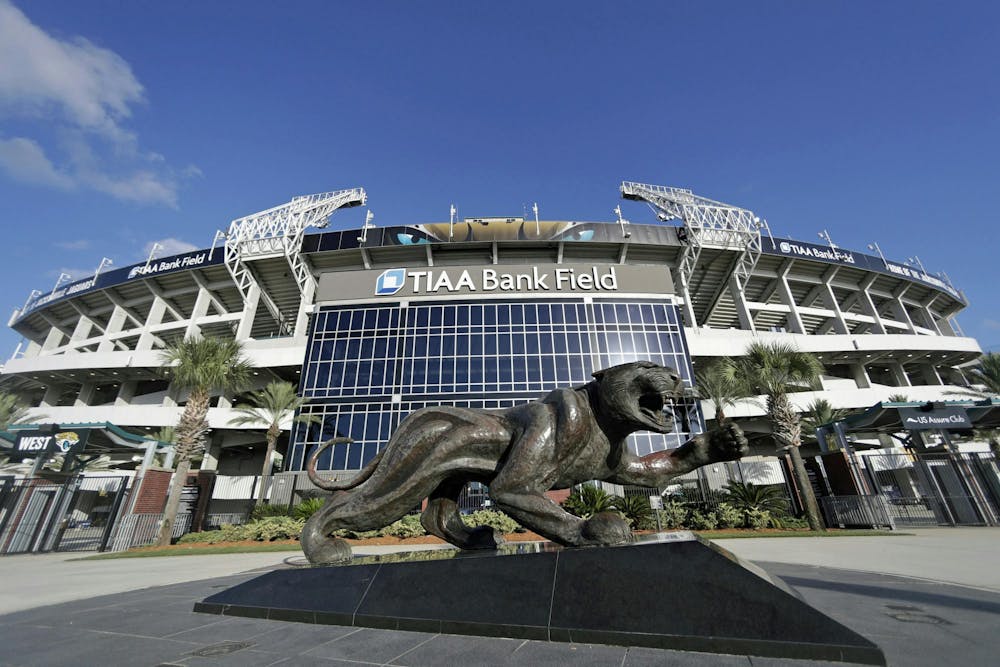Barking Bulldog fans, slow-roasted gators, painted faces, liquor-filled solo cups and orange-and-blue pinstriped overalls are all staples at Florida and Georgia’s annual rivalry game, hosted in Jacksonville.
The universities of Florida and Georgia have faced off in Duval County every year since 1933 (except in 1943 due to World War II and 1994-1995 due to renovations) at EverBank Stadium. But now, more renovations to the venue will change to the rivalry game.
Construction to EverBank Stadium began in February 2025 after a deal for $1.4 billion in renovations was approved in June 2024. The NFL stadium, home to the Jacksonville Jaguars, plans to add a transparent canopy roof, new seating and wider concourses.
The renovated stadium plans to seat 63,000, with an ability to expand to over 70,000 to accommodate large events like concerts, international sporting events and, of course, the annual Florida-Georgia football game.
Although construction is already underway, the Jaguars will continue to play at their home stadium through 2025 and 2026, with a reduced seating capacity of 43,500 next year. While the Florida-Georgia game is set to take place in Jacksonville this year, the 2026 and 2027 matchups will be played outside of Jacksonville.
In 2026, the game will be held at Mercedes-Benz Stadium in Atlanta. The year after, it’ll take place at Raymond James Stadium in Tampa.
Sometimes called “The World’s Largest Outdoor Cocktail Party,” the Florida-Georgia game rarely disappoints, bringing thousands of fans from each university for one of college football’s most iconic neutral-site rivalry games.
With looming renovations forcing the rivalry to vacate Jacksonville, some fans believe it’ll be difficult to replicate the city’s gameday atmosphere elsewhere.
Romell Williams, the football beat writer for UGA’s student newspaper, the Red & Black, believes Florida’s 2026 clash with Georgia in Atlanta will be much like a home game for the Bulldogs because of the proximity to Athens.
The neutral game in Jacksonville adds a unique experience for fans and players alike, he said, with the stark contrast of a split crowd. He added he hopes the Florida-Georgia game remains at a neutral site in the future.
“One side has Georgia, one side has Florida, and it’s just a fierce rivalry even for the football players but also for the fans,” Williams said. “That makes it very, very different from other rivalries, and it makes it more impactful.”
Williams added there will always be a fire in the Florida-Georgia game because of the storied history and playoff implications that come with the midseason matchup.
The annual game also brings in a load of revenue for the city -– roughly $30 million in total economic impact each year.
Sharon Kates, general manager of the Hampton Inn in downtown Jacksonville, said the Florida-Georgia game is the biggest event of the year for the hotel. She added the location begins preparing two months in advance by doubling or tripling its inventory to accommodate the high volume of guests.
“The buildup starts that Monday, and then it continues and gradually gets higher and higher and higher and higher — the revenues do,” Kates said. In response, the hotel doubles its active staff and ensures no one has a day off over the weekend, she said. No vacations, requests for days off or paid time off are allowed the week of the game.
Kates, who has lived in Jacksonville for 25 years, also said the amount of visitors who travel to Jacksonville for the Florida-Georgia game has grown in recent years. After COVID-19, fans came back even stronger, bolstered by the large number of Florida and Georgia fans housed in Jacksonville, she said.
Revenue from the one week is sometimes triple what the hotel makes in a month, Kates added.
“We, as hoteliers in Jacksonville, we look forward to that because it never really wavers,” Kates said. “You can almost bet your bottom dollar that you’re going to sell out.”
Looking forward, the game’s move to Atlanta and Tampa means Jacksonville will have to make up for a two-year loss in revenue.
Kates said the hospitality industry would be greatly impacted by the loss of the game in any facet and it would be a “gut punch,” to the city.
“Jacksonville will definitely not go down without a fight,” she said. “We have a dog in this fight.”
Kates also wished luck to other cities that may host the game in the future, harping on the need to be prepared for the surge of customers Jacksonville has faced each year.
“You need to be proactive, because Florida and Georgia fans are nothing to play with, especially their football,” she said. “We have everything set, we know what to expect, we know, so it’s kind of like a polished machine.”
Michael Rinner, owner of Sound of Spirits Distillery in Jacksonville, shared a similar sentiment. He said the game has a huge impact on small businesses like his. The distillery increases its inventory in anticipation of the surge in customers.
“There’s a reason they call it the biggest cocktail party in Florida,” Rinner said. “Everybody’s coming down, tailgating, having a good time, and so they will stop at the distillery and try our products so we can spread the word a little bit.”
The gameday carries a vibrant atmosphere, unique to the neutral site of Jacksonville, Rinner said. Nobody is angry, nobody is fighting and the whole week is “awesome,” he said.
When asked how he’d respond to those calling for the game to be moved outside of Jacksonville, Rinner yelled, “Don’t do it!”
“It’s a big booster for every small business in this area, so when they leave for two years, it will hurt,” he said. “As a small business, you depend on every dollar you make.”
Contact Curan Ahern at cahern@alligator.org. Follow him on X at @CuranAhern.

Curan is a third-year journalism-sports & media major who currently serves as the football beat reporter for The Alligator, now in his third semester with the paper. When not at his computer screen writing, Curan enjoys spending time outdoors, hanging with friends, family and pets, and watching the Patriots lose (no, he doesn't miss Brady).






